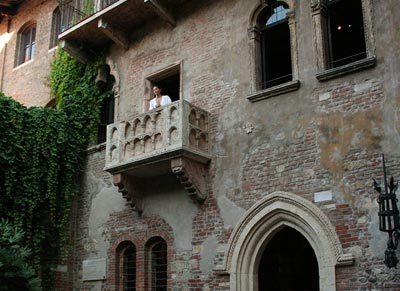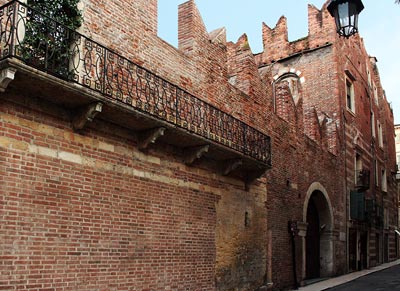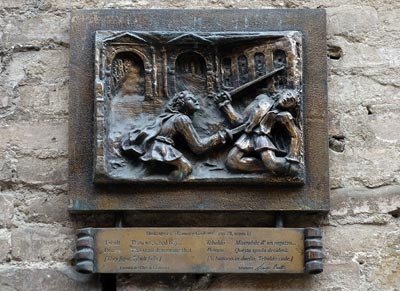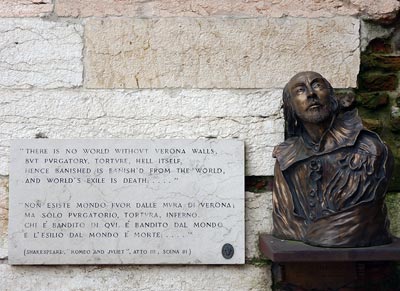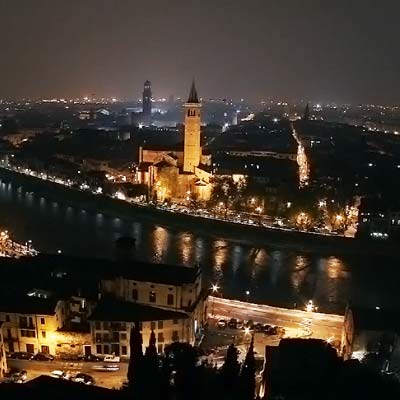Romeo's House

Romeo's house is a medieval palace in the centre of Verona. A sturdy tower and high crenellated walls make it look like a small castle. Until the early fourteenth century it was the home of the Montecchi family who, according to legends and literary texts, was Romeo's family. In the English translation of the story they are the Montagues.
Oncoming Tours
Info and Bookings:
+39 333 2199 645 info@veronissima.com P.I. 03616420232 C.F. CPPMHL74L13L781C
Romeo's house is a stop of all our Shakespeare Verona tours. The building is private, inhabited, and we can only see it from the outside. With our guests we like to visit the house of the Capulets immediately after seeing the house of the Montagues. We walk along the shortest path and imagine that it was the same one Romeo ran to get to Juliet faster.
History, Legend, Literature
Two households, both alike in dignity,
In fair Verona, where we lay our scene,
From ancient grudge break to new mutiny,
Where civil blood makes civil hands unclean.
Romeo's house is located in an alley, central but a bit hidden in the oldest part of Verona, just behind the Scala Family tombs.
It is not a sumptuous noble palace, with frescoes and decorations, but a sort of austere and imposing brick castle. In the narrow, dark street where it is located it inspires a certain awe.
Guelphs and Ghibellies

As in many Italian municipalities in the 13th century, Verona too suffered the violent clashes between Guelphs and Ghibellines. They where the political supporters of the Pope (Guelphs) and of the Emperor (Ghibellines).
When one faction prevailed over the other, the defeated were slaughtered or exiled, their property confiscated. Grudge and desire for revenge were rampant feelings, feuds were usual.
On the high wall that surrounds the inner courtyard and on the massive tower of Romeo's house, you will notice a typical V-Shaped crenellation. It is called "swallo tail" in Italian and it was a Ghibelline symbol. The Montagues wanted to make their political affiliation known. This, however, exposed them to attacks and revenge and required a well defended dwelling, able to withstand a siege. That is the reason for such a stronghold in the very center of Verona. The enemies to defend themselves against were other citizens.
Montagues Exile

In the middle of the 13th century the Ghibellines prevailed throughout the Veneto. They were led by the brutal Ezzelino da Romano who established his dominion over the region. In Verona the Montagues supported him, increasing their prestige in the city.
In 1259, Ezzelino died. The Council of Verona appointed Mastino I della Scala as the ruler of the city. It was the first step in the transition from a Comune, in which power was shared between important families and corporations, to a Signoria, with all the power was in the hands of a single family.
The Montagues did not accept to lose their influence in Verona. In 1325, together with other families, they plotted to overthrow the Scala. The plan was discovered and the Scala family banned all conspirators from the city. They also confiscated all the assets of the Montagues, including their palace in Verona, which they assigned to the Nogarola, their faithful allies.
Half way between history and fantasy

There is a thin line that divides the story of Romeo and Juliet from facts and the historical context of medieval Verona.
Shakespeare and the other authors do not tell us what was the ancient grudge that opposed the families of equal nobility. It is not hard to imagine that it was old resentment from the old feuds of Guelphs and Ghibellines, not entirely dormant at the beginning of '300. Dante instead gives us a clue in the sixth chapter of Purgatory, where he speaks of the disasters of faction struggles in Italy:
Come see the Montagues and Capulets,
Monaldi and Filipeschi, careless man,
already troubled those, and these in dread!
And in Romeo's literary exile echoes the historical one of the Montecchi.
Want to know more?
Visit the House of Romeo
Romeo's house is now a private building. On the ground floor it houses a typical Veronese tavern where you can taste traditional dishes. Despite the location there are still many Veronese people who frequent it.
Since people live in it we cannot visit the inside of Romeo's house. From the outside you can still breathe the atmosphere of the violent period of Verona at the end of '200.
For inquiries and further information on guided tours and Shakespearean itineraries in Verona, or if you want to book one of our tour guide who will let you discover this fascinating aspect of the city:
Further Information:
+39 333 2199 645 info@veronissima.com P.I. 03616420232 C.F. CPPMHL74L13L781C
+39 333 2199 645
info@veronissima.com

 IT
IT 日本
日本 DE
DE FR
FR 中文
中文 ES
ES
